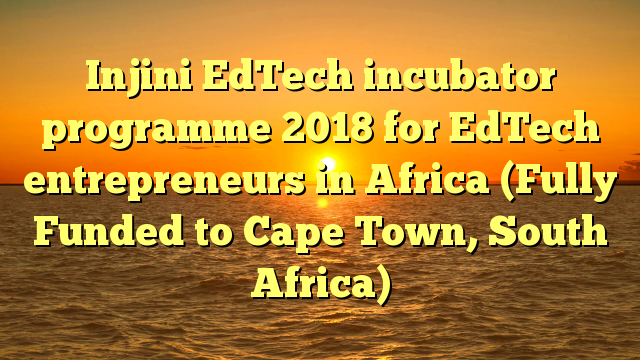On Wednesday (11th July 2018) Injini, an ed-tech incubator from Cape Town announced eight startups that will join its 2nd cohort. This came after the incubator received more than 800 applications from 36 countries in Africa. The eight startups from Zimbabwe, South Africa, Kenya, Nigeria, and Ethiopia were selected from 800 applicants that were then reduced to 15 finalists.
After its launch in 2017 Injiri hit the headlines as the first ever African edtech incubator. Its first ever cohorts included eight startups. The startups were Accelerated, Early Bird, M-Shule, Mtabe, Syafunda, Uthini, Yo’ Books and Zelda. Jamie Martin the founder of Injini during his speech at the office of Amazon Web Services in Cape Town said that the incubator used three criteria to settle to the shortlisted startups.
According to Martin the first criteria is sourcing for an innovation that offers access. The second criteria that the hub looks for are the great team. He said that the move was because a lot of the applicants are still in their early stage, so the platform supports the team as they support the innovation. Additionally, the incubator looked at the solutions with evidence of support. Martin said that the incubator always tests the edtech startups in comparison to what has been tested in the globe. According to him, there has been criticism that educational tech is not aligned to any evidence, so the incubator works hard to be backed with evidence. He said that the second cohort stands out compared to the first one with the fact that the Nigerians have joined the second cohort. The first cohort had no Nigerian startups. Nigeria has three startups out of the eight that are listed to join the second cohort.
He also said that second cohort has fairly cut across the education sector compared to the first one where a good number of the cohorts had what he termed as ideal solutions. The likes of the Zimbabwean based Learning Factory or Langbot offers solutions that are unusual. According to Martin nobody came up with an idea of using Facebook Messenger bots in teaching language. He added that nobody gave an idea of equipping Zimbabwean rural schools with solar powered with videos on them. According to him, the second cohort brings in a little bit more off-the-wall solutions compared to the first one. Below is the list of the eight selected startups that will join the second cohort.
Nigerian based SlateCube. It was co-founded by Emerald Kwekowe and Chris who are using technology to address the unemployment challenge in the country. The platform allows users to train, employ and manage the best talents.
Nigerian based ScholarX. Co-founded by Maxwell Ogunfuyi and Bola Lawal the platform helps to solve the challenge of funding students. It does that by assisting university students in getting tuition.
South African based Nahama Africa. Co-founded by Koki Kapa and Alexandra Flusk the startup works on offering mathematics and science teachers through online training and also teaching content.
Zimbabwean based Learning Factory. Co-founded by Sean Magama, Manners Msongelwa and Addi Mavengere the startup provides users with multimedia educational tools delivered using the solar-powered server.
Ethiopian based Langbot. Co-founded by Rémi Veyrier and Nathanael Gossaye the platform has come up with a Facebook messenger chatbot that uses gamification and AI to teach languages.
Kenyan based eLimu. Founded by Sam Rich, the eLimu is a literacy application that provides users with games and stories illustrated and written by artists and teachers.
Nigerian based Bluebic. Co-founded by Chukwuyem Obima and Favorite Onwuemene, Bluebic is a school management software for K12 and ECD (early childhood development) schools.
Injini launched its five-month incubation program earlier this week. It will give every startup a direct funding, accommodation, and funding worth $50,000. The incubator revised its incubation programs based on the feedback from the first cohorts. The changes include a shorter a more updated program and a section that allows founders to get back to their local markets to pilot their solutions.
 We just launched our WhatsApp channel. Want to get the latest news from the Tech in Africa?
We just launched our WhatsApp channel. Want to get the latest news from the Tech in Africa?



